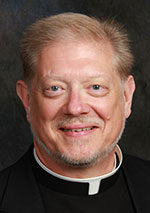That All May Be One / Fr. Rick Ginther
This Lent, be more conscious of what faith traditions share
 Lent is a Christian season. For older Catholics, this may be a surprise.
Lent is a Christian season. For older Catholics, this may be a surprise.
We who are older remember the days of a Counter Reformation mentality. We thought that all things which smacked of Catholic practice were jettisoned by the “reformers” in the 16th century.
Well, we were misinformed, in part due to distance and unfamiliarity. We were not allowed to visit other churches except for a periodic wedding or funeral. And then we were to observe, not participate in any way.
This is not true anymore. Just witness the annual National Workshop on Christian Unity prayer service on Jan. 25, which saw Christian leaders gather to pray together (cutt.ly/unityservice).
Indeed, the Irvington Association of Ministers, to which I belong, has for years hosted Lenten Soup and Bread/Prayer Services each Wednesday during the season. We will do so again, beginning on March 9. While COVID has led us to not have the soup and bread meals this year, we will still have the prayer services. Each week, a church will host the gathering, and another pastor will preach.
Formerly, the evenings started on Ash Wednesday. But since more of us now celebrate an Ash Wednesday service, we begin the following week.
Lent is a Christian season. Let me outline those who celebrate it, some common practices, and some aspects unique to one or more denomination.
The Anglican, Eastern Orthodox, Lutheran, Methodist, Moravian, Oriental Orthodox, Reformed (e.g., Presbyterian and Congregationalist) and United Protestant Churches observe Lent. Some Anabaptist, Baptist and nondenominational churches do as well.
The term “Lent” is from Old English and Old Dutch. It means “spring season.”
The more ancient words, tessarakosti in Greek and Quadragesima in Latin, mean “40th.” The connection is to the 40 days, especially Jesus’ 40 days in the desert before his public ministry.
Most Churches and ecclesial communities regard Lent as a time of preparation through prayer, fasting and almsgiving (Mt 6:1). The preparation is of the person of faith for the celebration of Easter. Conversion of life is stressed.
The forms of fasting vary. Lutherans, Roman Catholics and Anglicans (Episcopalians) have days or periods of fasting
and/or abstinence (Ash Wednesday, Fridays in Lent, Good Friday). For others, fasting encompasses every day of Lent (e.g., Moravians, Reformed Churches).
The Byzantine Church, such as St. Athanasius the Great Parish in Indianapolis, observes the “Great 40 Days.” The Eastern Orthodox observe the “Great Fast.” There are distinct periods of fasting among them.
In most Eastern Churches, those in communion with Rome and those not, the “Great Lent/Fast” is broken only after the celebration of the Easter Divine Liturgy.
I recall the joy of my Melkite classmates at the University of Notre Dame who described the “feast” which broke the “fast”!
The Oriental Orthodox have varied traditions. But among those who use the Alexandrian Rite (Coptic Catholic, Coptic Orthodox, Ethiopian Catholic, Ethiopian Orthodox, Eritrean Catholic and Eritrean Orthodox and Churches), eight continuous weeks of fasting are observed.
Abstinence from foods (meat and meat products) varies greatly across the Christian spectrum.
Roman Catholics in the United States abstain on Ash Wednesday and the Fridays of Lent.
In contrast, Lenten abstinence from all animal products (i.e., eggs, fish, fowl and milk from cows, goats) is prevalent in some Orthodox and Eastern Catholic Churches and Eastern Lutheran ecclesial communities.
Lent may be a four-letter word, but it is more than filled with deep personal and communal spiritual meaning and a breadth of observance.
As we Christians enter Lent this year, let us be more conscious of what we share in our diversity of expression. And more conscious of one another in prayer.
(Father Rick Ginther is director of the archdiocesan Office of Ecumenism and Interreligious Affairs. He is also the pastor of Our Lady of Lourdes Parish, Indianapolis.) †
 Lent is a Christian season. For older Catholics, this may be a surprise.
Lent is a Christian season. For older Catholics, this may be a surprise.